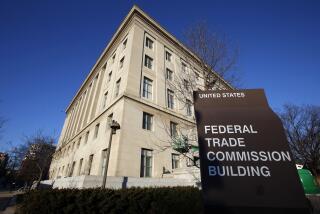Congress Panel Risks Veto on Trade Package : Votes for Advance Notice on Major Plant Closings
- Share via
WASHINGTON — A House-Senate panel, defying threats of a presidential veto, agreed Tuesday to include in the trade bill a requirement that companies provide 60 days’ advance notice of major plant closings and layoffs.
The measure is one of several that President Reagan has warned would prompt him to reject the entire package of trade legislation--one of the Democratic leadership’s top priorities in this session of Congress.
Large corporations also have signaled that they will withdraw their backing from the trade bill if the provision is not deleted. The Administration contends that the requirement would limit the flexibility of U.S. firms and mark a step toward excessive government control of business.
The action by the joint subcommittee, almost certain to be ratified later this month by the full House-Senate conference panel, poses serious problems for lawmakers and Administration officials who were hoping to shape a bill that Reagan could sign. The Administration is expected to make a last-ditch effort to persuade House and Senate Democratic leaders to scrap the provision in the full committee.
The subcommittee essentially adopted the Senate version of the plant-closings provision. The House had passed separate legislation that would have required employers to give 180 days’ advance notice and would have called on employers to consult with labor before closing a plant.
The measure would affect all companies that have 500 or more employees and firms with 100 or more workers in cases where the closings or layoffs affect a third or more of the work force. Executives of companies that fail to provide advance notice would be subject to civil penalties of up to $500 a day, up to a $30,000 maximum. European companies face similar requirements.
Approval Expected in April
The decision came as Congress and the Reagan Administration began critical negotiations that will shape the final version of the controversial omnibus trade bill. No fewer than 17 separate House-Senate conference subcommittees are slated to finish the bulk of their work this week on parts of the 1,100-page measure.
The final version of the legislation is expected to be approved formally in mid-April, after Congress returns from its Easter recess.
Today, the lawmakers are likely to tackle controversial provisions to require foreign investors to give advance notice when they plan major purchases of stock or takeovers of U.S. corporations, to create a new international agency to buy up Latin American debts owed to commercial banks and to punish Japan’s Toshiba Corp. because one of its subsidiaries sold Western technology to the Soviet Union.
Negotiators are also expected to scrap a proposal by Rep. Richard A. Gephardt of Missouri, a former Democratic presidential candidate, that would impose tariffs on countries such as Japan and West Germany that have huge trade surpluses with the United States if they do not move quickly to reduce those imbalances.
The White House objects to all these provisions and believes that it has increased leverage as a result of Gephardt’s decision to bow out of the presidential race. The Democratic congressman had made trade the central issue of his brief campaign, advocating tough action to crack down on America’s trading partners. But the strategy proved less effective than some had expected, slowing the momentum in Congress for so-called tough trade legislation.
Treasury Secretary James A. Baker III, who is shepherding the Administration’s negotiations with Congress, has said flatly that the White House will not accept any bill that contains either the registration requirements for foreign investment or the Latin American debt provisions.
Baker contends that the restrictions on foreign investment would hurt America’s ability to attract foreign capital, which is needed to help finance the budget deficit, and would violate international trade rules. He argues that the proposal on Latin American debt would encourage debtor nations to abrogate their obligations and would amount to a taxpayer bailout of commercial banks.
“If they don’t satisfy Baker, they don’t have a bill,” one Administration official said.
Although this week’s negotiations on the trade bill are critical, the wrangling between Congress and the White House has been going on for several weeks.
On Friday, the White House offered lawmakers a token concession by agreeing to a proposal that would enable the President to block foreign takeovers of U.S.-based firms when policy-makers believe that the acquisition would not be in the national interest. The measure was designed to provide the White House with added authority in the wake of last year’s attempted takeover of Fairchild Semiconductor by Fujitsu of Japan.
More to Read
Get the L.A. Times Politics newsletter
Deeply reported insights into legislation, politics and policy from Sacramento, Washington and beyond. In your inbox twice per week.
You may occasionally receive promotional content from the Los Angeles Times.










